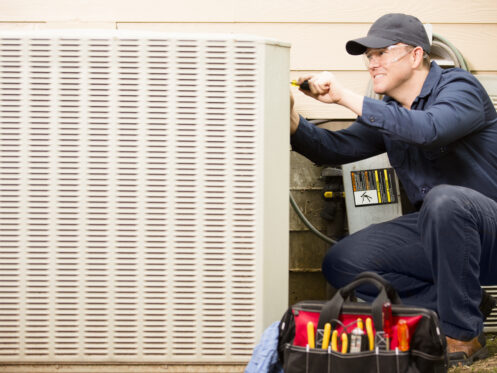Blown HVAC fuses can lead to a world of problems and inconveniences. Knowing how to spot a blown fuse and what to do is critical to keeping your home safe and comfortable.
How Many Fuses Does an HVAC System Have?
The precise configuration and design of an HVAC system determine its fuse count. In most cases, HVAC systems include one or more fuses for various components, including the blower motor, compressor, condenser fan, and control board. Although some systems may have separate fuses for different functions, others may have one main fuse for the entire system.
What Are the Signs of a Blown HVAC Fuse?
Recognizing the signs of a blown HVAC fuse is crucial for maintaining the functionality of your heating and cooling systems. One common indication is when the HVAC system fails to turn on altogether, suggesting a lack of electrical power. Another sign of a blown fuse is the inability of specific system components, such as the blower fan or condenser, to operate even when they have secure power connections. If the system’s performance suddenly drops or you notice warm air blowing out of the vents, it might be due to a blown fuse. Lastly, if you see any damage to the fuse, such as blackening or melting, it’s a blown fuse.
What Causes Fuses To Blow?
Several things can cause HVAC fuses to blow. One common cause is electrical overload, often resulting from a sudden surge in power. A surge in power can quickly occur during a thunderstorm or when multiple appliances run simultaneously. Problems with the HVAC system’s wiring or connections may also lead to resistance, which in turn causes the system to overheat and eventually blow a fuse.
Another possible cause is a short circuit, which happens when electrical currents don’t follow their ordinary course but instead take an alternate one; this can lead to excessive heat, ultimately blowing the fuse. Clogged air filters can also blow fuses by limiting airflow and increasing the load on the HVAC system. Lastly, blown fuses might result from motors or capacitors that are either too old or too worn out to work correctly, which causes them to draw too much current.
Are Blown Fuses Dangerous?
Blown HVAC fuses pose various dangers to the HVAC system and the property’s occupants. First, they indicate potential electrical issues, such as overloaded circuits or short circuits, which can lead to electrical fires if left unresolved. Second, other HVAC system components may sustain damage without proper electrical protection, which can lead to costly repairs and replacements. Additionally, a malfunctioning HVAC system can result in discomfort or health hazards for occupants, particularly during extreme temperatures.
Will Resetting the Breaker Fix a Blown Fuse?
Resetting the breaker may temporarily restore power to the HVAC system after a blown fuse, but it does not provide a permanent fix. If the fuse repeatedly blows, resetting the breaker without addressing the root cause can further pose safety risks and damage the HVAC system. It’s essential to investigate the cause of the blown fuse, such as electrical overloads, short circuits, or faulty components, and rectify the problem to prevent future occurrences.
How Do You Know the Location of Fuses?
If you need to find the fuses for your HVAC system, you should look at the breaker panel or fuse box. Alternatively, some HVAC systems have dedicated fuse panels near the unit. To find the position of the fuse, look in the owner’s handbook or on the HVAC unit. If you’re unsure where to look or how to reach the fuses, it’s best to call our professional HVAC technicians for help.
Should You Fix a Blown HVAC Fuse Yourself?
Fixing a blown HVAC fuse yourself can be tempting but may not always be advisable. Although it may seem simple to change a fuse, you must first determine why the fuse blew in the first place. Moreover, HVAC systems involve complex electrical components that require expertise to handle safely. Mishandling electrical components can lead to electric shocks or fire hazards. Therefore, it’s generally recommended to enlist the services of our qualified HVAC technician to diagnose and repair the underlying cause of a blown fuse. Attempting to diagnose and rectify these issues yourself could result in further damage or pose safety hazards.
Are There Ways To Keep Fuses From Blowing?
Preventing HVAC fuses from blowing requires proactive maintenance and careful system handling. Maintenance tasks, like changing air filters or scheduling professional inspections, can help ensure your system operates efficiently and reduce strain on its electrical components. Another way to keep blown fuses at bay is to limit the usage of high-power appliances that share circuits with HVAC units.
Furthermore, addressing any underlying issues promptly, such as loose wiring or worn-out components, can prevent electrical faults that lead to blown fuses. Ensuring proper ventilation and airflow around the HVAC unit will also help prevent overheating and reduce the risk of electrical failures.
Are There Specific Brands of HVAC Fuses That Are More Reliable?
There are several HVAC fuses to choose from, but which is most reliable depends on details like the system’s layout. The design, materials, and conformity to industry standards determine a fuse’s dependability, even if certain brands have a better reputation for quality and longevity. It’s best to consult an HVAC technician to choose fuses from reputable manufacturers.
How Often Should You Replace HVAC Fuses?
Several variables determine how often HVAC fuses should be replaced. These include the system’s age and condition, consumption patterns, and maintenance methods. A good rule of thumb is to check the HVAC fuses once a year during the scheduled maintenance and replace them if they show any wear or danger. Worst case scenario: the HVAC system has ongoing electrical troubles or blown fuses, which need immediate attention from one of our HVAC technicians. Maintaining the HVAC system according to the manufacturer’s recommended intervals and fixing fuse problems immediately will help keep it running well and extend its lifespan.
What To Do if an HVAC Fuse Keeps Blowing Again and Again?
First, ensure the system’s wiring and connections are free of apparent damage. After that, check for electrical overloads or short circuits and make sure the HVAC system gets enough power. A more severe issue, like a broken part or a botched installation, may be at play if the problem continues. If this happens, it’s advisable to contact our professional HVAC technicians. Our experts can assess the situation and advise you on how to stop the fuses from blowing again. Our technician’s priority will be fixing the root cause of a constantly blowing HVAC fuse.
Here at Cozy Home Services, we have effective solutions for blown HVAC fuses. We are Vacaville’s professional HVAC company in improving the comfort of your Vacaville home with our extensive list of HVAC, plumbing, and indoor air quality services. That includes cooling and heating installations, repairs and maintenance, ductless mini-splits, and heat pumps.



